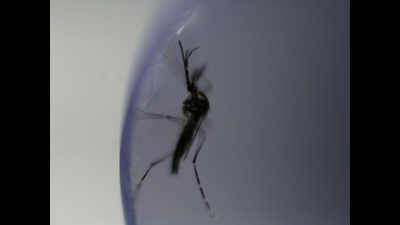- News
- City News
- Hyderabad News
- Is the mosquito that bites a dengue or malaria carrier?
Trending
This story is from August 30, 2017
Is the mosquito that bites a dengue or malaria carrier?
State Lacks Protocol, Labs To Test Samples

An Aedes Aegypti mosquito with the dengue-blocking Wolbachia bacteria
HYDERABAD: Is that mosquito buzzing about you at home a carrier of Dengue? Or is it a carrier of it Malaria, Japanese Encephalitis or Filariasis?
The bad news is, no one knows. Telangana has no protocol in place to find this out nor does it have labs that can perform tests on mosquito samples to learn in which part of the state the deadly ones lurk.
The only good news, if it can be called so, is that about 14% of mosquitoes that buzz about in the city are from the Armigeres family that are considered 'nuisance mosquitoes', in that they do suck blood but do not carry any disease that they transmit to humans.
The rest, are the potentially JE or Filariasis-carrying Culex mosquitos that comprise about 65% of the pesky insects, followed by about 14% of Anopheles that carry Malaria and about 7% are the Aedes mosquitoes that carry Dengue.
"But the cases we see are just the tip of the iceberg. Many cases get mistaken for viral fevers and sometimes get treated by over-the-counter medications. Only when the fever becomes severe or happens to be a case of Malaria do patients go to a doctor," she said.
Multiple government officials confirmed that there was no method in place to trap mosquitoes from different parts of the city or state and send them for analysis to a lab to find out what viruses they carry.
And nearly all of them said such a system might prove useful in preventing any possible outbreak of either Malaria or Dengue or other diseases spread by these insects by identifying insect populations carrying diseases and preventing their spread to other parts of the city or the state.
For its part, the GHMC conducts 'density studies' of mosquitoes and using extrapolation methods, arrives at possible numbers of each species of mosquito that are present in an area, "Since the diseases spread by each species are known, we alert the local health department officials of potential cases and then take up steps such as anti-larval operations and fogging based on the number of mosquitoes we find in a given area," GHMC's chief entomologist V Venkatesh told TOI.
Regarding the department's functioning, Dr Prabhavati said, for instance, when a case of dengue is confirmed, the health department conducts an intensive campaign around the home of the patient. "We collect blood samples from the family and from those living in 50 houses around the patient's home to test for possible Dengue," she said.
The bad news is, no one knows. Telangana has no protocol in place to find this out nor does it have labs that can perform tests on mosquito samples to learn in which part of the state the deadly ones lurk.
The only good news, if it can be called so, is that about 14% of mosquitoes that buzz about in the city are from the Armigeres family that are considered 'nuisance mosquitoes', in that they do suck blood but do not carry any disease that they transmit to humans.
The rest, are the potentially JE or Filariasis-carrying Culex mosquitos that comprise about 65% of the pesky insects, followed by about 14% of Anopheles that carry Malaria and about 7% are the Aedes mosquitoes that carry Dengue.
"As much as 90% of mosquito control is in the hands of people, who can take simple steps to eliminate their breeding," Dr S Prabhavati, additional director, Vector Control, health department, said.
"But the cases we see are just the tip of the iceberg. Many cases get mistaken for viral fevers and sometimes get treated by over-the-counter medications. Only when the fever becomes severe or happens to be a case of Malaria do patients go to a doctor," she said.
Multiple government officials confirmed that there was no method in place to trap mosquitoes from different parts of the city or state and send them for analysis to a lab to find out what viruses they carry.
And nearly all of them said such a system might prove useful in preventing any possible outbreak of either Malaria or Dengue or other diseases spread by these insects by identifying insect populations carrying diseases and preventing their spread to other parts of the city or the state.
For its part, the GHMC conducts 'density studies' of mosquitoes and using extrapolation methods, arrives at possible numbers of each species of mosquito that are present in an area, "Since the diseases spread by each species are known, we alert the local health department officials of potential cases and then take up steps such as anti-larval operations and fogging based on the number of mosquitoes we find in a given area," GHMC's chief entomologist V Venkatesh told TOI.
Regarding the department's functioning, Dr Prabhavati said, for instance, when a case of dengue is confirmed, the health department conducts an intensive campaign around the home of the patient. "We collect blood samples from the family and from those living in 50 houses around the patient's home to test for possible Dengue," she said.
End of Article
FOLLOW US ON SOCIAL MEDIA










